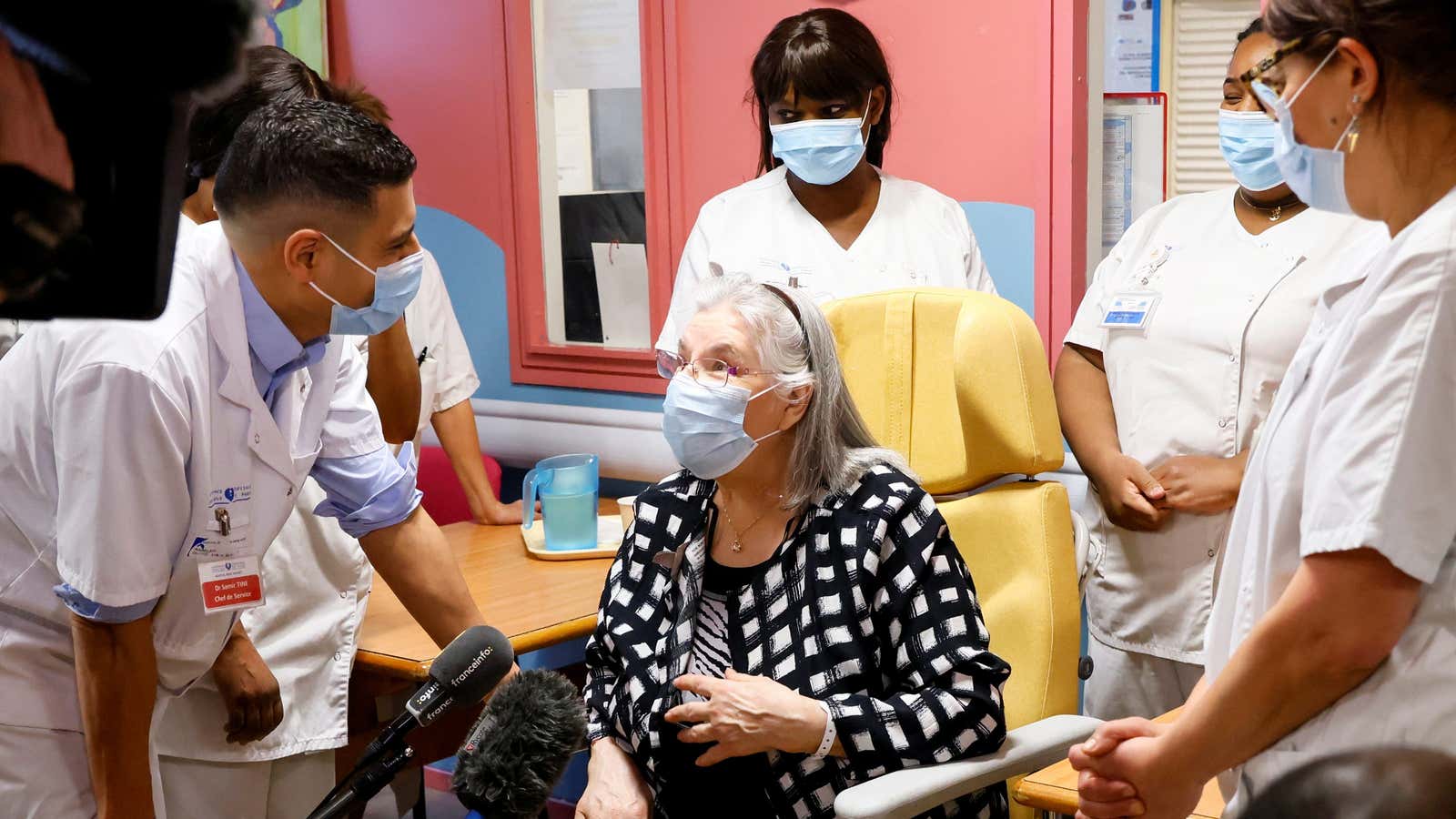On the morning of Dec. 27, in a suburban hospital north east of Paris, 78-year-old Mauricette (links in French) became the first person in France to receive a vaccine against Covid-19, developed by Pfizer and BioNTech. Mauricette, whose last name is not known, is a retired housekeeper and lives in a long-term care facility due to chronic health problems. After receiving her jab in front of healthcare staff and reporters, she said she was thrilled to become “famous.”
But within days, Mauricette had become a rallying cry for anti-vaxxers online, who claimed she wasn’t properly informed that she would be vaccinated, based on snippets of a video showing her asking a nurse a question. (It’s not clear what she asked and the hospital confirmed that she gave her consent to be vaccinated.) The fake news and speculation weren’t confined to fringe conspiracy sites—they could also be found on the Twitter feed of Florian Philippot, a far-right member of the European Parliament.
Misinformation and fear are derailing France’s already-slow Covid-19 vaccine rollout, barely a week after it began. The government’s cautious response to both helps explain why, as of Jan. 1, only 516 people had been vaccinated against Covid-19 in France, according to the health data aggregation site CovidTracker. In comparison, the UK administered jabs to more than 130,000 people in the first week of its vaccine rollout.
It’s not a supply problem: According to CovidTracker, France has more than 560,000 doses of the vaccine in stock. The country also has one of the best healthcare systems in the world (pdf). So, what’s behind the delay?
The government argues it’s the logistical challenge of setting up the rollout in retirement and nursing homes, whose residents are the first on the list to receive the vaccine. Health minister Oliver Veran said vaccinations would pick up this week, and promised that France would catch up to its neighbors by the end of the month.
But some experts believe it won’t be that easy. The French are among the most vaccine-skeptical people in the world and in a survey of French adults conducted one month ago by the research firm Ifop (pdf, p. 13), only 39% said they intended to get vaccinated against Covid-19 when they had the chance. Meanwhile in August, researchers at the University of Zagreb pooled together the results of public opinion surveys about Covid-19 vaccination from 26 European countries. On average, 58% of almost 25,000 respondents across the surveys were willing to get a vaccine once it became available.
To counter vaccine hesitancy, the French government designed a rollout centered on individual choice. Health authorities constantly stress that getting the jab isn’t mandatory. They offer every patient a consultation with a doctor that collects patients’ consent and informs them of “the benefits and risks of vaccination.”
(While it is standard practice for French people to meet with doctors before being vaccinated, in the context of a pandemic, the process can cause delays. For example, nursing homes must give patients an “addition time of reflexion” to decide whether they want the vaccine or not. They can request that a family member be present, but many nursing homes are limiting outside visits because of Covid-19.)
For some, this is an honorable attempt at transparency. For critics, it’s overkill. Axel Kahn, president of the French National League Against Cancer, writes that France’s delay in vaccinations is linked to “the administrative burden and procedural rigidity of the bodies of the State.” He blames a public communication strategy that over-emphasizes risks and de-emphasizes progress. “What of the hope of the vaccine, the path it traces, the extraordinary scientific adventure it represents?,” he writes. “Almost nothing.”
